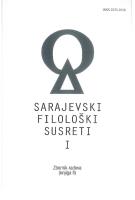POETIČKE I STILSKE FUNKCIJE MOTA / EPIGRAFA U ROMANU DERVIŠ I SMRT MEŠE SELIMOVIĆA
POETIC AND STYLISTIC FUNCTIONS OF THE MOTTO / EPIGRAPH IN MEŠA SELIMOVIĆ’S NOVEL DERVIŠ I SMRT
Author(s): Esad DurakovićSubject(s): Novel, Bosnian Literature
Published by: Bosansko filološko društvo
Keywords: Meša Selimović; Death and the Dervish; motto; epigraph; strong text position; antithetics; poetics; transformation;
Summary/Abstract: Selimović’s novel Derviš i smrt affirms the polarity as its poetic principle. Derviš is the hero who exits from his sufi contrition into the world and comes into conflict with it in a drammatic way, discovering that in this world the virtue was destroyed and that every uniqueness is demolished. In the affirmation of Selimović’s poetic polarity, which functions excellently in the construction of the drammatic quality of the novel, the author uses parts of the text from the Qur’an in the positions of the chapters’ mottos. At the same time he recomposes and reshapes the original Qur’anic text intervening significantly in its ideological level, but also in harmony with his artistic freedom and translating the reshaped Qur’anic text in the domain of the estethic. The motto in Selimović’s novel is made unusual in many ways – until the “identity of the motto” itself becomes uncertain. The principle of polarity in this way is not only expressed in the tragic destiny of the main character, but also in the functioning of he motto which the author, since it is a sacral text – whose sacrality is emphasized by a related footnote – desacralizes by complex poetic methods, bringing it into the position of ideological contrariety with the original, but it is also harmonized with the tragic faults of the hero’s awareness and his ancient drammatic conflict with the world. The motto at the beginning of the novel communicates merrily with the texts with which the other chapters of the novel begin and thus, by frequent distribution, they enhance the motto’s function in a particular type of intertextuality which, since it is a sacral, although reshaped text – refers to a whole array of aspects of Islamic tradition in the domain of its history of literature, poetics, to the semiotics of space and semiostylistics.
Journal: Sarajevski filološki susreti: zbornik radova
- Issue Year: 1/2012
- Issue No: 2
- Page Range: 48-68
- Page Count: 21
- Language: Bosnian

